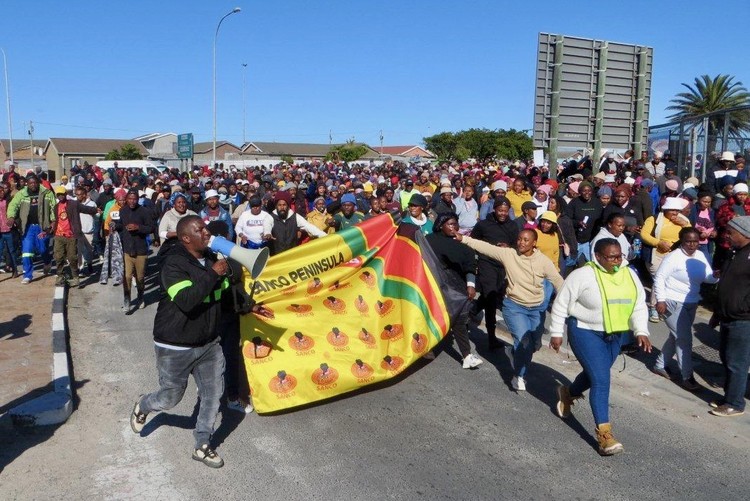Over 1,000 shack dwellers protest: “We are tired of living in squalor”
City of Cape Town accused of “persistent failure to collect rubbish ” in informal settlements
Over 1,000 people from informal settlements marched to the City of Cape Town subcouncil offices in Khayelitsha on Thursday. Photo: Vincent Lali
- On Thursday over 1,000 people from informal settlements marched to their subcouncil offices in Khayelitsha, Cape Town.
- They were protesting against the City’s “persistent failure to address pressing matters of uncollected rubbish, EPWP salary rates, power supply and fire kits”.
- The City said it takes “grievances seriously” and is “looking into the particulars of this matter”.
Over 1,000 people from new land occupations and old informal settlements marched to the City of Cape Town subcouncil 10 offices at the Khayelitsha Training Center on Thursday. They were demanding better garbage collection, electrification of settlements, and equitable salaries for cleaners.
“We are tired of living in squalor,” said community activist Sibusiso Mdlankomo from Taiwan informal settlement. He said residents pile their garbage at a site next to the N2, but the City does not collect it. He said they also lack garbage bags.
Sisanda Phike said the uncollected rubbish is blocking stormwater drains in Monwabisi Park. She said garbage was piling up near Yibanathi Educare centre.
“A place where kids learn is not supposed to be dirty,” she said.
Community leader Wendy Nkewu said they last saw rubbish collection in Island informal settlement two months ago. “We now clean our areas ourselves,” she said.
Shipping containers for storing rubbish are now jam-packed and stink, she said. “We have to close doors and windows when we eat,” she said.
The garbage has also created a rat problem, she said.
“The City gives us drugs to kill rats instead of removing the dirt,” said Nkewu.
She and other shack dwellers have pooled money to buy petrol to burn the piles of uncollected garbage in their area.
Unequal pay for cleaners recruited from the community was also raised by protesters. The waste management companies pay cleaners R245 per day while the City pays cleaners R130 per day through the Expanded Public Works Programme, according to a community leader.
“We are prepared to work as cleaners for the City if it doesn’t decrease the salaries, and if it pays us the same amount as the waste management companies,” said Nkewu.
She said people from the new occupations have listed their names with the City database for work, but “we see people from brick houses come and clean in our areas, while we are available to clean them ourselves”.
The protesters said they are fed up with living with either no electricity or dangerous illegal connections which cause fires and electrocutions. They also cause outages and give rise to tensions with residents of formal houses.
“Eskom takes months to repair damaged transformers,” said Phike, “and residents from old areas fume at us.”
Community leader Xolelwa Mjekula from Lansdown Road informal settlement said many people were left homeless by shack fires but they no longer received starter kits to rebuild.
“We place fire victims in abandoned shacks while we put money together and get donations to help them rebuild their homes,” said Mjekula.
The protesters gave the City seven days to respond to their demands. Their memorandum states: ”We are protesting because of our frustration with the persistent failure to address pressing matters of uncollected rubbish, EPWP salary rates, power supply and fire kits.”
Subcouncil 10 manager Mandlenkosi Sithonga received the memo and said he would pass it on to the City. “You are not here to make requests but to make demands. The Constitution is on your side,” he said.
In an email comment, the City said that it is “looking into the particulars of this matter”.
“We take grievances seriously and will consider all matters raised.”
Support independent journalism
Donate using Payfast

Next: Five trucks torched in Gqeberha protests over the past month
Previous: Thirteen years after making way for World Cup, Durban residents still waiting for houses
© 2023 GroundUp. This article is licensed under a Creative Commons Attribution-NoDerivatives 4.0 International License.
You may republish this article, so long as you credit the authors and GroundUp, and do not change the text. Please include a link back to the original article.
We put an invisible pixel in the article so that we can count traffic to republishers. All analytics tools are solely on our servers. We do not give our logs to any third party. Logs are deleted after two weeks. We do not use any IP address identifying information except to count regional traffic. We are solely interested in counting hits, not tracking users. If you republish, please do not delete the invisible pixel.

